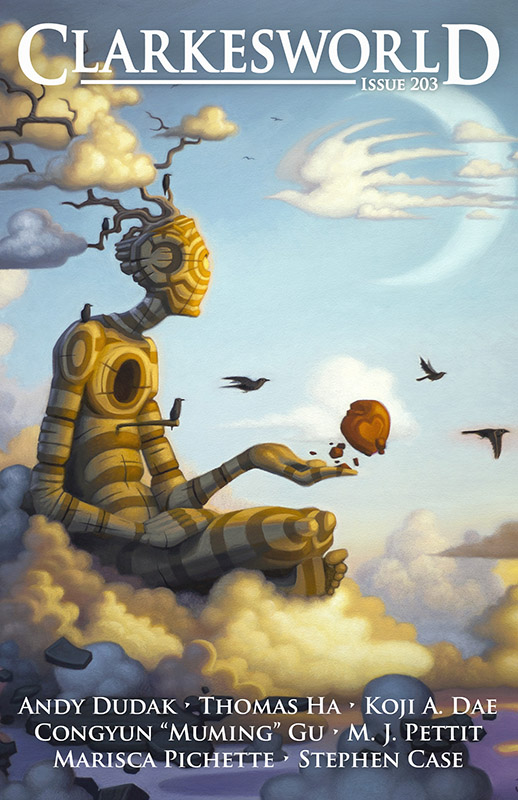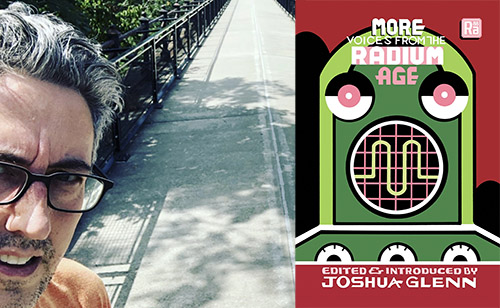CLARKESWORLD Q&A
By:
August 2, 2023

The prolific sf/f editor, critic, and agent Arley Sorg interviewed HILOBROW’s Josh Glenn — in his capacity as founding editor of the MIT Press’s RADIUM AGE series — for this month’s issue of the sf/f magazine Clarkewsorld. The Q&A was pegged to the release — on August 1st — of the anthology More Voices from the Radium Age (MITP).
Here’s an excerpt:
CLARKESWORLD: What are some of the most important differences between the selections for the new anthology, More Voices from the Radium Age, and the 2022 installment, Voices from the Radium Age?
GLENN: I selected stories for the first collection with the intention of introducing today’s SF readers for the first time to the very notion that the science fiction genre emerged out of a Radium Age era about which they haven’t ever heard. To that end, I thought it was important to showcase proto-SF writing by authors famous for their non-SF work—including Arthur Conan Doyle, two of whose Professor Challenger stories we reissued this year; Jack London; and E. M. Forster, whose “The Machine Stops” is an all-too-prospicient satire of what he regarded as H. G. Wells’ naïve techno-utopianism. I also wanted to draw attention to once-popular proto-SF writers—William Hope Hodgson; Neil R. Jones—about whom we’ve forgotten; as well as writers—W. E. B. Du Bois; Rokeya Sakhawat Hossain—who challenged the nascent genre’s prejudices.
With the second collection, while I wanted to feature Abraham Merritt, George Allan England, and others who were popular proto-SF and SF writers during this era, this time around I thought I’d take readers on a mini-tour of SF’s literary sources—for example, the “weird” fiction of Algernon Blackwood, Edith Nesbit’s admixture of SF and horror, the Symbolist worldview of Valery Bryusov, and May Sinclair’s fourth-dimensional musings.
CLARKESWORLD: Other than the time frame, what were the factors that determined if a piece would go into these volumes?
GLENN: I have a substantial spreadsheet of stories that I’d like to reissue. Each entry is color-coded and meta-tagged to indicate pertinent considerations such as whether the story is in the public domain, whether the author is female or a person or color, whether the theme is one that we’ve already tackled . . . and most importantly, how much I’ve enjoyed reading it. It’s crucial that everything we publish is truly entertaining.
CLARKESWORLD: Were there stories you wanted to include in More Voices but couldn’t?
GLENN: Many! However, we’ll do more collections in the years to come. We’re leaning now toward doing more thematic collections—about robots, AI, aliens, et cetera. I pitched a long list of such themes to [the MITP], and we’ve settled on one for starters.
CLARKESWORLD: Are there stories in More Voices that may surprise readers?
GLENN: George C. Wallis’ story “The Last Days of Earth” is a very early example of cli-fi; it features a proto-Web known as the Worldwide Pictorial Telegraph (relying on “reflected Marconi waves”) and perhaps even more surprisingly, a female character who defies humankind’s rules.
Wells’ “The Land Ironclads” not only introduces the notion of an armored tank but prefigures video game-like telewars fought by drone jockeys.
And H. P. Lovecraft fans will enjoy reading one of his own favorite stories, Merritt’s “The People of the Pit”—about a fiendish alien race and advanced technology trapped beneath an Alaskan mountain!
MORE RADIUM AGE SCI FI ON HILOBROW: RADIUM AGE SERIES from THE MIT PRESS: In-depth info on each book in the series; a sneak peek at what’s coming in the months ahead; the secret identity of the series’ advisory panel; and more. | RADIUM AGE: TIMELINE: Notes on proto-sf publications and related events from 1900–1935. | RADIUM AGE POETRY: Proto-sf and science-related poetry from 1900–1935. | RADIUM AGE 100: A list (now somewhat outdated) of Josh’s 100 favorite proto-sf novels from the genre’s emergent Radium Age | SISTERS OF THE RADIUM AGE: A resource compiled by Lisa Yaszek.

